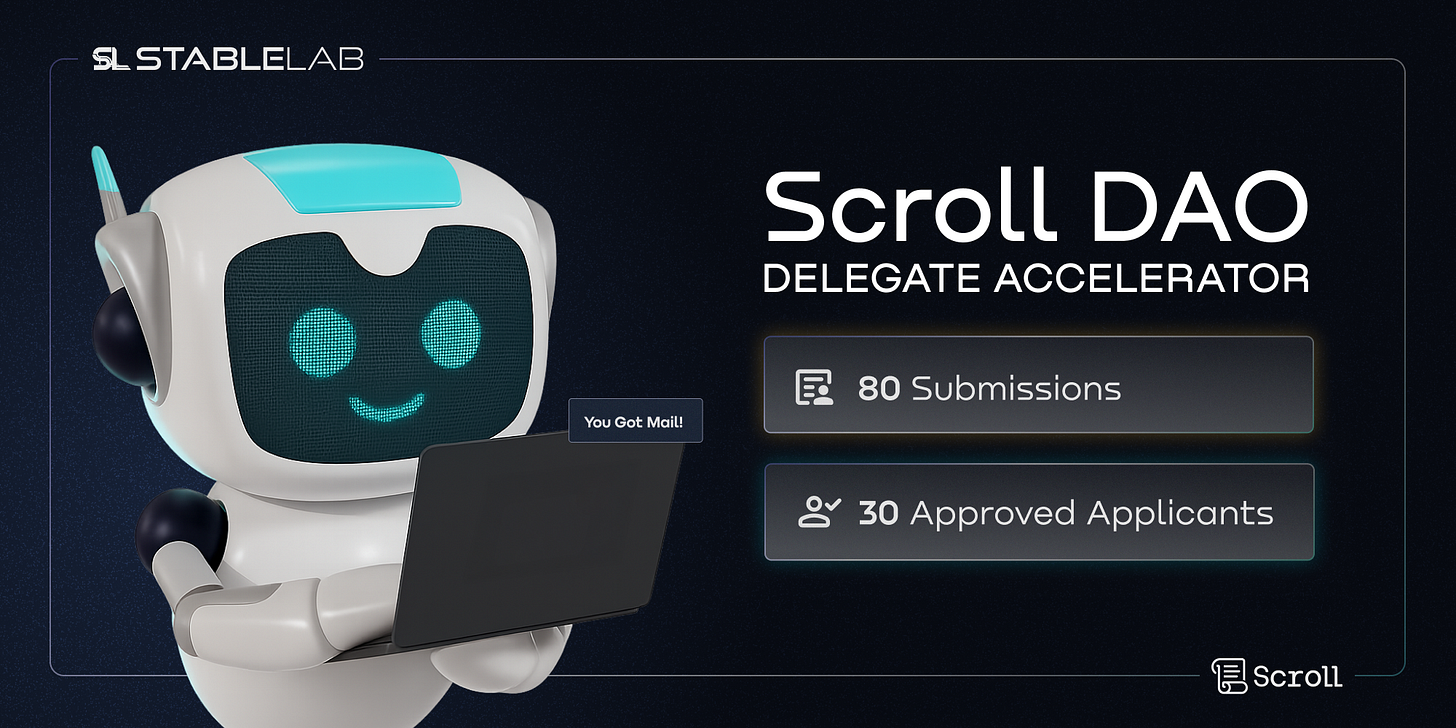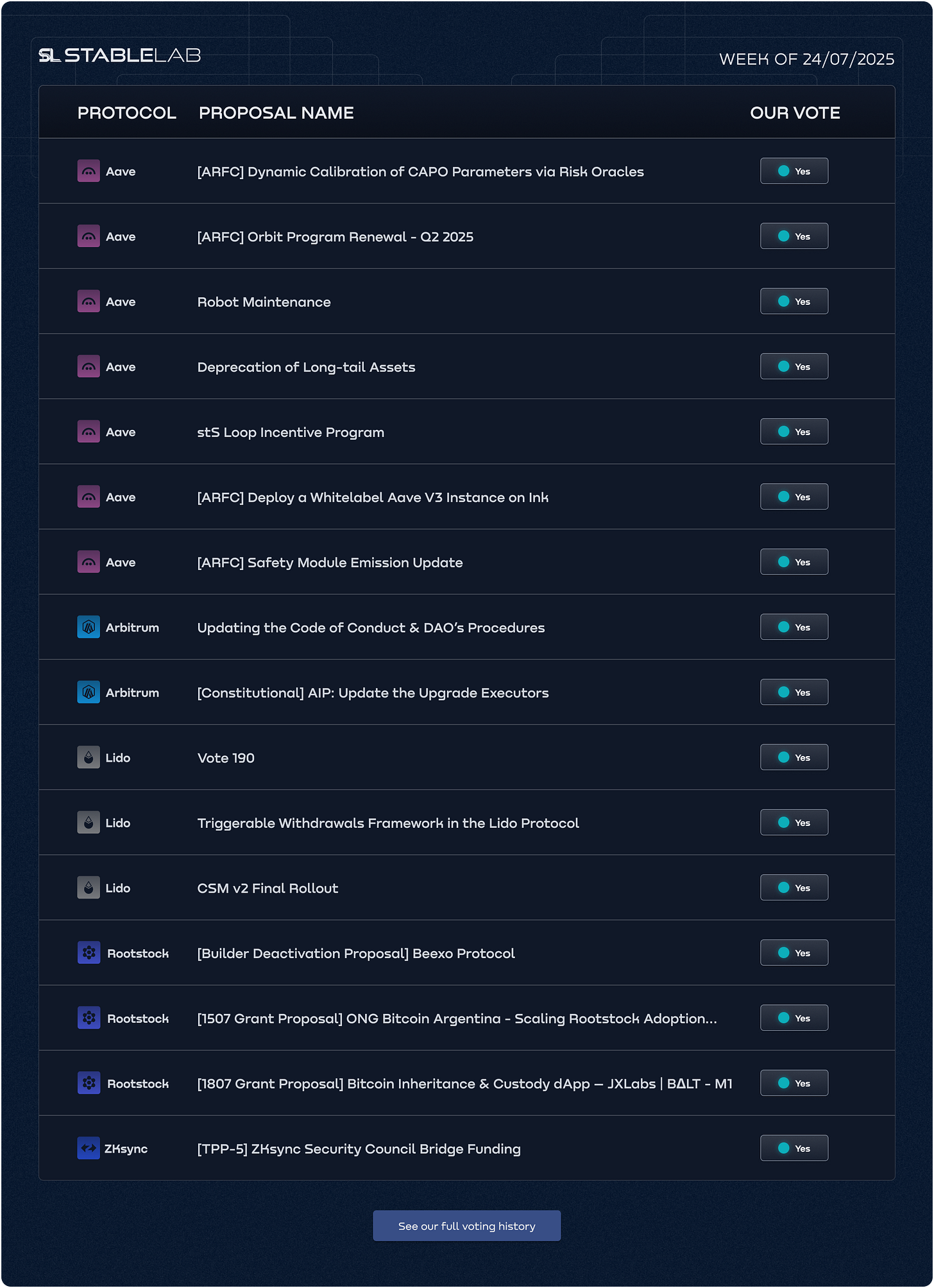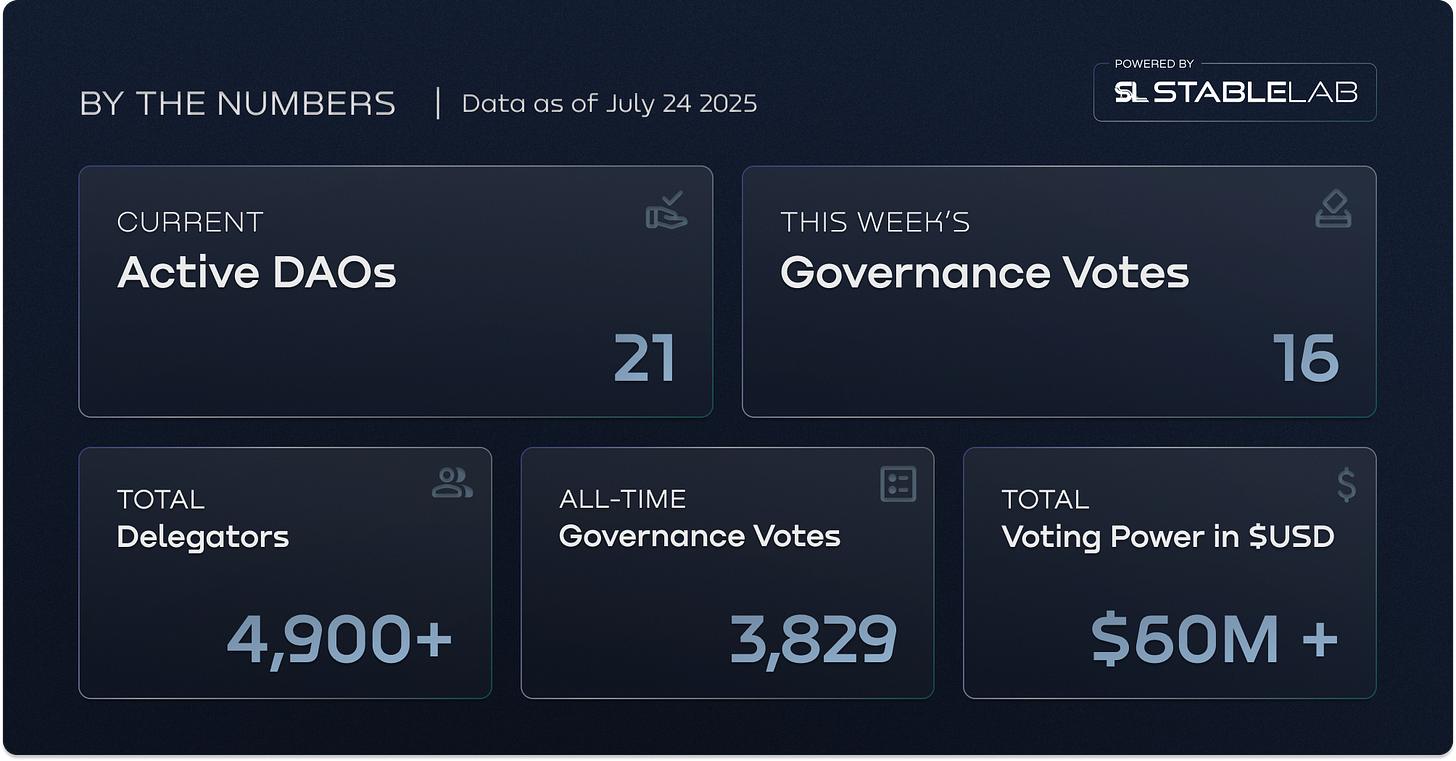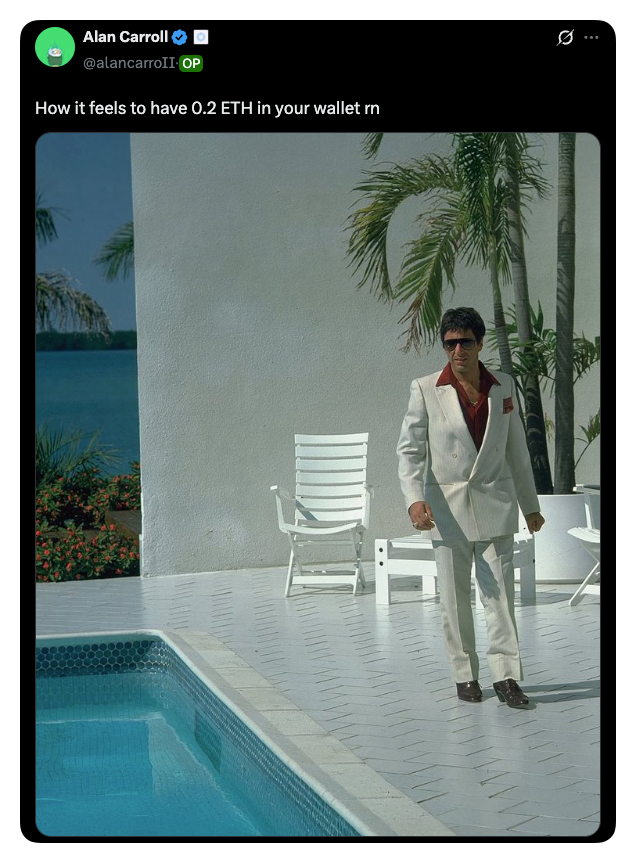👨🔬 Governance Lab #106
Lab Report #106 – Polygon’s CTB Season 3 Proposal, Uniswap’s Governance Process RFC, Arbitrum’s Delegate Incentive Overhaul, and more
gm frens 👋
Welcome back to the Governance Lab, your weekly source for all things StableLab, DeFi, and DAO Governance.
At a Glance 👀
🟣 Polygon DAO proposes 80M POL for CTB Season 3 grants and contributor operations
🟠 Uniswap DAO opens RFC on quorum policy, treasury delegation, and optimistic governance
🔵 Arbitrum DAO introduces Tier X and cuts rewards by 40% in Delegate Incentive Program update
Let’s dive in 🏊
Polygon DAO
Polygon DAO proposes 80M POL budget for CTB Season 3 grants and operations
The Community Treasury Board (CTB) has introduced PFP-4, a proposal to allocate 80M POL from the Polygon DAO Treasury to fund Season 3 of its grants and operations program, running from August 1, 2025, through January 31, 2026.
The proposal emphasizes improved transparency through monthly updates, final retrospectives, and GitHub-linked reporting for funded workstreams.
Season 3 introduces several changes based on past feedback, including a pilot bounty program for small contributions, a revised performance review framework, and a clearer budget breakdown. These updates are designed to strengthen CTB’s approach to strategic contributor-led funding.
PFP-4 is currently open for discussion and is expected to move to Snapshot following community review.
Uniswap DAO
Uniswap DAO explores quorum review and optimistic governance in RFC on process improvements
The Uniswap Accountability Committee (UAC) has released a request for comment outlining governance challenges and potential improvements, focusing on quorum thresholds, operational efficiency, and DAO scalability.
Uniswap currently enforces one of the highest quorum requirements among DAOs—6.66% of circulating UNI, equivalent to roughly $280M in voting power. The RFC notes that while a lower quorum might increase participation, it also raises security concerns given the DAO’s $3.9B treasury. The UAC does not support changing the threshold at this time but encourages continued discussion.
The RFC explores optimistic governance as a way to streamline execution. This model enables pre-approved actions by committees or delegates unless vetoed during a dispute period. It is currently used for cross-chain deployments and may be applicable to broader DAO operations.
Other areas of exploration include treasury delegation, identity-verified delegates (IDVs), and governance architecture inspired by Aragon’s Stage Proposal Processor. The RFC is intended to guide structured community dialogue, with no immediate governance actions proposed.
Arbitrum DAO
Arbitrum DAO proposes Delegate Incentive Program updates introducing Tier X and reducing compensation by approximately 40%
Arbitrum DAO has proposed updates to its Delegate Incentive Program through DIP v1.7, introducing a new Tier X for large token holders and reducing compensation across all tiers by approximately 40 percent. The changes respond to lower governance activity in 2025 and aim to improve alignment among high-voting-power delegates.
Tier X applies to delegates with 500,000 ARB or more, requiring only voting participation and offering monthly rewards of $1,000 to $1,500, capped at 5,600 ARB. This group, which holds over 107 million ARB in total, currently shows below-average participation rates. The proposal includes a proportional reward structure that scales compensation based on performance, rather than awarding full payouts to all qualifying delegates.
Additional changes raise the minimum threshold for new participants from 50,000 to 500,000 ARB, exclude vote-buying platforms, and replace community Snapshot votes for appeals with Arbitrum Foundation mediation under new terms and conditions.
The updated framework keeps the 50-delegate cap in place and introduces KPIs focused on retaining current contributors and onboarding at least five additional Tier X-eligible delegates. If approved, the changes would be applied retroactively and continue through October 2025.
Links
🚀 Launches, Deployments, Partnerships, and M&A
Ethena unveils StablecoinX
Token Transparency Framework Third Cohort live
📑 Reads, Insights, and Reports
The Political Arena and its Gladiators by Raph Spannocchi
Overview of DAOs and Governance by Patrick McCorry
🧗 Milestones & Updates
Arbitrum DAO - ARDC V2 Final Update & Concluding Report
Gnosis DAO - Kpk 2025 H1 Review for GnosisDAO
Superfluid DAO - Ecosystem Campaigns Season 3
Sky Ecosystem - Capital Transparency Mid-year 2025 Update
🔒 Security, Risk, & Hacks
Compound DAO - Compound Foundation’s Security Service Provider Recommendation
JitoDAO - Rotate the Security Council
🗞️ Everything Else
Arbitrum DAO - Request for a Maintenance Upgrades Working Group
CoW DAO - Operational CoW DAO Safe Renewal 2
dYdX DAO - dYdX Foundation Grants Proposal
GMX DAO - GLP Distribution Plan of Action
JitoDAO - Accelerate Jito Expansion by Activating a Community subDAO
Maple DAO - MIP-018: Q3 Fee Buyback Increase
Morpho DAO - OP Grant Allocation for USDC Growth on Base
📺 Podcasts, Presentations, & Listens
John Adler (Celestia) Talks Proof of Governance on The Rollup
Sergej Kunz, 1inch - Stable School Podcast Episode #16
Hasu: How Lido is Redefining Ethereum Staking on the Defiant Podcast
Proposal Tracker™️
✅ VOTE APPROVED | Aave DAO - Deploy a Whitelabel Aave V3 Instance on Ink
Summary: This ARFC propsal passed with ~99.8% support to license a centralized Aave V3 deployment for the Ink Foundation (Kraken’s Ink chain). Aave DAO service providers will support the launch for six months, with the DAO set to receive at least a 5% revenue‐share of borrow volume. The Ink Foundation also commits over $250 M in initial liquidity incentives. This marks a strategic push into institutional lending and Layer‑2 adoption
⚡ VOTE UNDERWAY | Lido DAO - CSM v2 Final Rollout
Summary: This proposal is seeking DAO approval to finalize the rollout of the Community Staking Module v2 (CSM v2), including deployment parameters, reward structures, and validation models for home stakers and node operators. Upon approval, the proposal will move to on‑chain voting followed by coordinated implementation across client tooling and infrastructure, enabling more permissionless participation
💬 DISCUSSION | Aave DAO - [Direct-to-AIP] BGD. Aave v3.5 (v3.4 part 2)
Summary: This proposal by BGD Labs outlines the next phase of Aave Governance enhancements, building on Aave v3.4’s work and preparing for a v3.5 upgrade. It focuses on transitioning toward multi‑chain native governance with lower gas costs (via meta‑transactions), permissionless automation, upgraded voting assets, and cross‑chain infrastructure (a.DI/Aave Robot). The proposal lays foundational architecture for streamlined permission and executor migrations, optimizing governance efficiency and scalability.
From the Lab
Scroll DAO Delegate Accelerator: 30 Approved Applicants!
The Scroll DAO Delegate Accelerator has just accepted 30 out of 80+ applicants! If you're among the selected, check your inbox. If not, stay tuned open-source resources are on the way. Thank you to everyone who applied. 📧
❲ Our Voting ❳
📆 July 18th → July 24th | 🗳️ Total Votes: 16
See our full vote history and detailed rationale HERE.
Meme
I’d love to hear from you! Drop me a DM on Twitter with your thoughts, feedback, or any comments you may have about the newsletter. I write for you, the reader :)
💌 FOLLOW US
Website | Twitter | YouTube | Mirror | LinkedIn
🤝 DELEGATE TO US @ stablelab.eth
Tally | Boardroom | Linktree







Slight error with Polygon DAO's proposal, MATIC instead of POL, 6 million MATIC vs 80 million POL